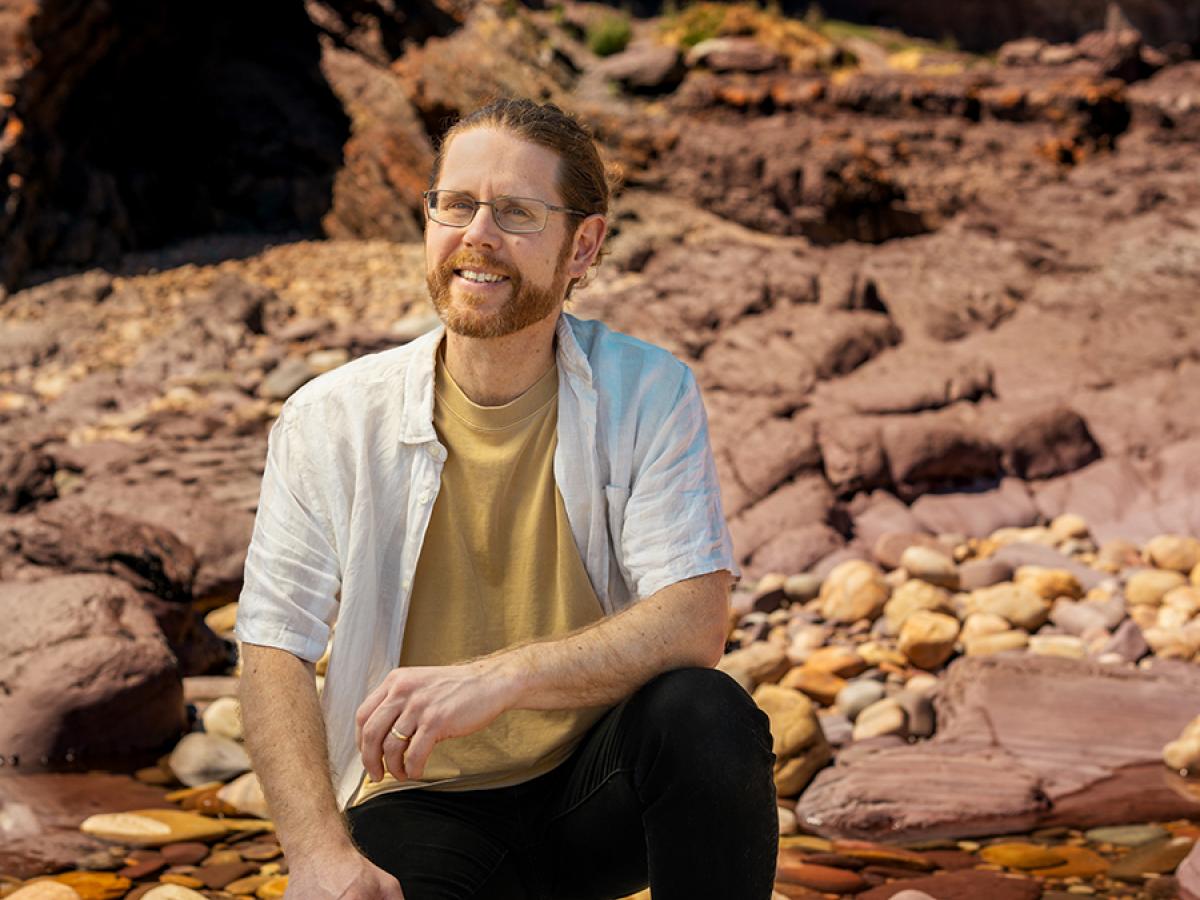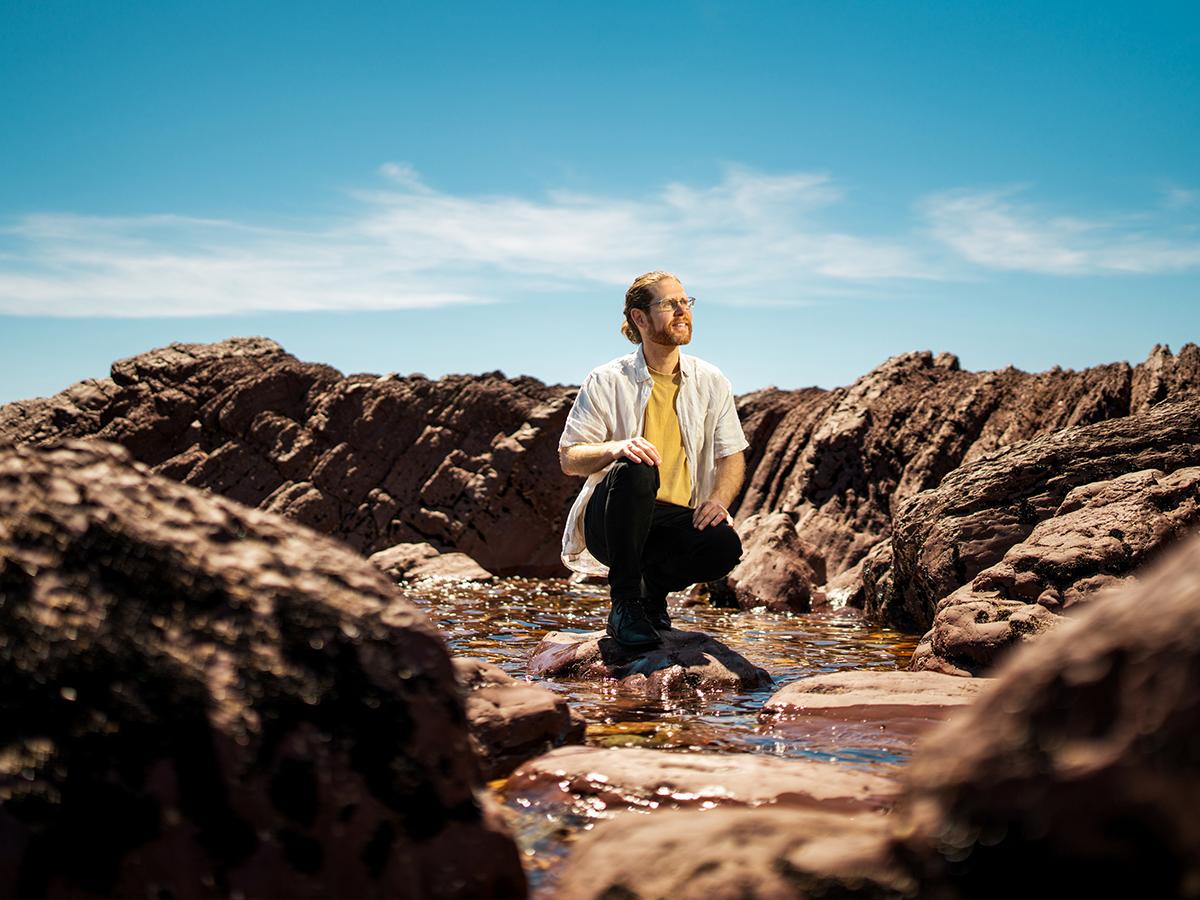Connected Conversations | Mark Kohler
The first in his family to go to university, Dr Mark Kohler arrived in Adelaide from rural Tasmania with $2000 in his pocket and a dream to study psychology. His unbridled curiosity and interest in discovering the ‘whys’ of life had prompted his father to suggest a career as a psychologist.
Hindsight shows it was a sage suggestion and today, Mark is Senior Lecturer in the School of Psychology—proving that, sometimes, parents really do know best. Now with five children of his own, Mark intertwines teaching and inspiring the next generation of psychology students with research endeavours focused on child wellbeing and learning.
In his relaxation time, Mark enjoys getting out into nature and exploring the scenic coastline near his home in southern Adelaide.

Please tell us your name and a little bit about yourself.
My name is Mark. I’m a Senior Lecturer and Chair of Learning and Teaching in Psychology here at the University. The broad focus of what I research is factors that are important for child wellbeing and learning. I’ve worked with a range of populations over my career but am finally focused on the group I’m most interested in—every day ordinary Aussie kids. I’ve always been interested in the structure or mechanism behind things, and originally (way back in high school) I was planning to study architecture or medicine. One day my dad mentioned he thought I’d make a good psychologist. Not knowing what one was, I looked it up and, as much as we hate to admit our parents are right as a teenager, got interested. The rest, as they say, is history, but I’ve always maintained my interest in working out why things work the way they do, rather than just whether they work (it might explain why so many things around our house don’t work! Good thing I didn’t become a tradie I guess). These days I tend to do less research in the lab and more out in applied settings, working with organisations such as Resilient Youth Australia and the Jane Goodall Institute.
Tell us a bit about your time at the University.
I was actually employed as ‘Senior Lecturer in Cognitive and Developmental Psychology’ in late 2018 but ironically haven’t taught on either subject since coming here! Most recently I’ve been teaching research methods and statistics - the course students love to hate! I also lead a research group called the Wellbeing in Learning and Development Lab (WiLDlab) and am quite active with the research group Develop Well (a concentration of developmental researchers in Psychology) and the Environment Institute.

What has been your journey to get where you are today?
I was the first in my family to go to university. I remember packing a duffle bag in rural Tasmania, with $2000 in my pocket left from that summer’s farm work. I caught a boat, then an overnight train from Melbourne to Adelaide, slept on the floor of the parents of a friend of my girlfriend until I found my own apartment, and then commenced my first semester. From there I completed Majors in Psychology and Biology at Flinders University (and loved it), took some time away from study to earn money to feed a new family, then returned to a Psychology Honours degree at the University of South Australia (UniSA), before a PhD at the Women’s and Children’s Hospital investigating neurocognitive and behavioural outcomes of treatment for sleep disorders in children. I was fortunate that my research group had been very successful in grant funding the year I completed my PhD, so I went straight into a fellowship in Paediatrics here at the University of Adelaide for a couple of years. After the funding dried up, I took a position as a Lecturer at UniSA, where I helped establish a cognitive neuroscience laboratory and degree, before finding myself back at Adelaide in the position I am currently in. I think my own journey has given me a particular soft spot for students from a rural background and those navigating the balance of having a family with study.
What has been your career highlight, to date?
There have been a few, but one that comes to mind is an acknowledgment a PhD student included in the front of their thesis. It read ‘Everyone needs a Mark Kohler in their life’. It helps me remember that we can make an important difference to our student’s lives and academic journey, and that the small things over time matter.

What do you love most about working at the University of Adelaide?
The people. That might seem a bit cliché outside of a university, but to an academic usually it’s the research, the academic environment, the prestige, the ability to expand knowledge and be world first, world leading and world changing that most people expect you to say. I ended up a bit burnt out at one point in my career (probably due to focusing on all those things I just mentioned!), and it has been this eclectic bunch of colleagues that has really made the difference to me finding enjoyment in my work.
Who (or what) inspires you?
I think anyone who just gets in and gives something a go. As an academic I tend to over-think things! But it is often the people who just ‘give it a crack’ that are the catalyst for action.
What is the best decision you have ever made?
Once you get married and have kids, I don’t think you are allowed to give any other answer! But seriously, my wife and children are definitely the best decision.
What is your favourite thing about living in Adelaide?
To this day I never really made the explicit decision to stay in Adelaide, but 25 years later I’m still here! It is such an easy place to live, and being in the Southern suburbs it is amazing to pop down to McLaren Vale on a weekend and discover a new café or vineyard with my wife, find a short hike, or go for a bit of a snorkel off the coast with my kids. We live close to Hallet Cove Beach, so that little bay always holds a special place for me, and even if you only have a few minutes to sit on the banks and watch the waves, it is never time wasted.

What’s something that people are surprised to find out about you?
While I don’t find it very strange personally, it always comes as a surprise (particularly to other academics) when I tell people I have five children. It is not the norm in academia, but then there is not too much normal about your average academic if you ask me!
What do you hope to be doing in 10 years’ time?
More of what I like, and less of what I don’t. More of what matters, and less of what doesn’t.
If you had to give a TED Talk about something unrelated to your work, what would you speak about?
Interesting question—because all that academics ever talk about is their work you know! OK, how about my mum. She passed away fairly recently after a very short and unexpected bout of cancer. After an experience like that your perspective on what you have in life changes. My mum was mostly a stay-at-home mum (housewife, homemaker, family manager, or whatever you call it in your world), but she was one of the strongest, self-actualised and giving people I have known. She taught me about being hopeful, being kind, the value of showing mercy to others (to use an old word), and how to not deny the badness of bad things, but still be able to navigate them (and sometimes just wait them out!)—we tend to call this resilience today, although that words gets a bit overused I think. I was so fortunate to have a mother like her, and while I would never do it justice, a TED Talk about the lessons she left me would definitely be… what’s the TED talk slogan? …‘Ideas worth spreading’.
